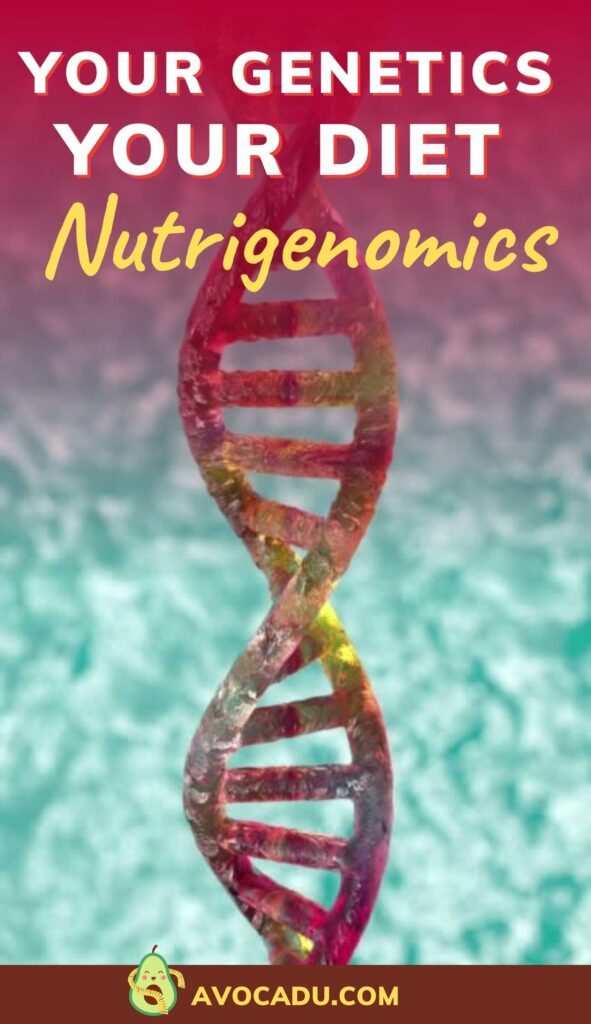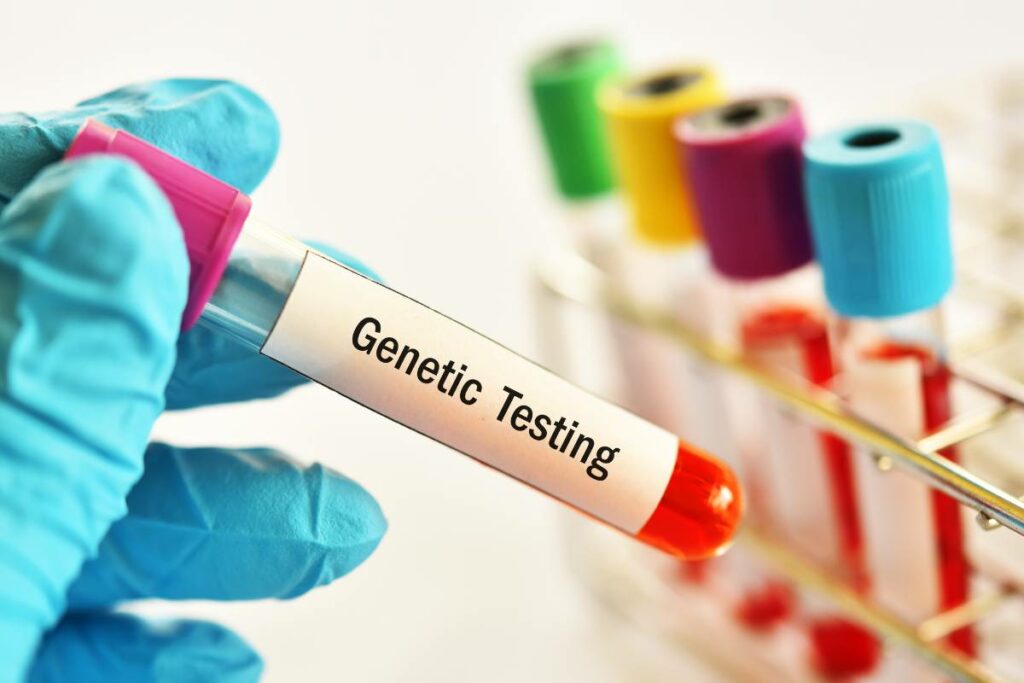Nutrigenomics: Personalizing Your Diet Based on Genetics
Ever found yourself baffled, watching a friend effortlessly shed pounds on a diet, while you struggle to lose even a single inch following the same regime?
Well, there’s more to this puzzle than just willpower and workout routines.
Welcome to the revolutionary world of Nutrigenomics, where the secrets of your DNA intertwine with nutritional science to unlock a personalized roadmap to your optimal diet.
This isn’t just about losing weight – it’s about discovering what your unique body needs to thrive. Your diet, tailored to you, by your own genetics. Now, isn’t that a game-changer?
Related Article: Biohacking: Transforming Personal Health and Wellness

This post may contain affiliate links, which helps keep this content free. Please read our disclosure for more info.
Understanding Genetics and Nutrition
It’s incredible to think about the secrets your DNA holds. It does more than just sketch out your physical attributes like the color of your eyes or your towering height.
Hidden within its labyrinthine strands are coded messages that dictate your body’s nutritional desires and demands.
Yes, you read that right! Those double helixes twirling inside your cells aren’t just deciding your physical traits; they’re also whispering secrets about how your body reacts to different nutrients.
They’re the reason why your best friend can handle a dessert fest while you’re wrestling with a sugar rush after one tiny chocolate chip cookie.
And let’s take a moment to reconsider nutrition. It’s not about punishing yourself with brutal calorie counting or resigning yourself to a lifetime of kale smoothies.
It’s about understanding the symphony of proteins, carbohydrates, fats, vitamins, and minerals that come together to nourish your body right down to the cellular level.
So, what happens when we put the puzzles of genetics and nutrition together? Welcome to the thrilling intersection known as Nutrigenomics!
This field of science delves deep into how your genetic makeup interacts with your diet, paving the way for a completely personalized approach to eating.
Instead of forcing your body to fit into a diet, imagine sculpting a diet to fit your body. Nutrigenomics provides the scientific framework to do just that.
The Role of Genetics in Determining Nutritional Needs

While it might seem perplexing when one person can indulge in carb-heavy meals without gaining an ounce, and another gains weight just thinking about pasta, the answer lies much deeper.
It’s not merely a matter of a speedy or sluggish metabolism. Rather, this is where the enchanting symphony of our genetics begins to play its tune.
Our genes, the biological blueprints that make us who we are, also have a substantial say in how our bodies process and react to different foods.
For example, some people’s genetic makeup may allow them to metabolize carbohydrates efficiently, allowing them to maintain or even lose weight, while others may not have that same capability.
Nutrigenomics: A More Personalized Approach to Nutrition

In a world that often tries to fit us into neatly labeled boxes, Nutrigenomics offers a refreshingly individualized perspective. It tosses aside the one-size-fits-all diet plans we’ve grown accustomed to and presents a new, more personalized approach to nutrition.
Imagine a diet plan not pulled from the pages of a best-selling wellness book or downloaded from a popular blog, but one sculpted uniquely for you.
This plan respects and accommodates your individual genetic makeup, taking into account every genetic strength and sensitivity. It’s not just another generic nutrition strategy; it’s a custom-fit diet, molded by the subtle nuances of your genetic profile.
Think of it this way: You wouldn’t wear a pair of shoes tailored for someone else’s feet, so why follow a diet designed for someone else’s genes?
In this light, Nutrigenomics isn’t merely intriguing; it’s revolutionary. It calls us to rethink our relationship with food, encouraging us to move beyond generic diet plans and to embrace a more personalized and empowering approach to nutrition.
One where you are not fighting against your body, but instead, partnering with it to reach your health and wellness goals.
Getting Started with Nutrigenomics

Now that we’ve piqued your interest in Nutrigenomics, you’re likely wondering how to begin your personalized nutritional journey. Well, you’ll be pleased to know that it’s a simpler process than you might imagine!
The first step on this adventure is a straightforward genetic test. This is similar to the tests used to explore your ancestry, only in this case, the focus is on the genes related to your nutritional and metabolic responses.
Once you’ve provided a sample, which is usually a simple cheek swab or saliva sample, it’s sent off to a lab where the magic happens.
Scientists will extract your DNA and analyze it, looking for specific genetic variants that influence your nutritional needs and how your body processes different types of food.
But don’t worry, you won’t need to decipher complex genetic reports on your own. After your results are ready, you’ll usually have a consultation with a nutrition professional.
They’ll walk you through your results, helping you understand what your genes are saying about your nutritional requirements.
The last, but definitely not the least, step in the process is to translate this genetic insight into a practical, personalized diet plan.
This is where the professionals’ expertise truly shines, as they use your genetic data to craft a diet strategy tailored specifically for you.
They’ll guide you on what foods to embrace, which to moderate, and any lifestyle changes that could enhance your overall well-being.
Starting your Nutrigenomics journey is an empowering step towards taking control of your health and wellness.
Nutrigenomics Tools to Get You Started

For those ready to start their nutrigenomic journey, there are several excellent resources available.
Two noteworthy recommendations that could provide invaluable insights about your unique nutritional needs are Everlywell’s Food Sensitivity Tests and the Pure Essentials Nutritional Genetics Test.
Everlywell’s Food Sensitivity Tests
If you’ve ever suspected certain foods might be causing you discomfort, Everlywell’s Food Sensitivity Tests could be a game-changer for you.
This comprehensive test covers a wide range of foods, making it an excellent choice for those who enjoy a diverse diet or eat a variety of cuisines.
The process is simple and hassle-free, and it allows you to identify foods that you might be sensitive to.
Once you have these insights, you can adjust your diet accordingly, possibly eliminating sources of discomfort that you’ve been grappling with.
Pure Essentials Nutritional Genetics Test
For a deep dive into your nutritional genetics, the Pure Essentials Nutritional Genetics Test is a fantastic tool. This easy-to-use test requires just a quick cheek swab.
After submitting your sample, you receive a comprehensive, personalized report packed with invaluable information.
This report doesn’t just skim the surface; it delves into details from 40 gene variations. These insights can help you understand your genetic disposition related to metabolism, detoxification, nutritional needs, and even your potential for deficiencies in some vitamins and minerals.
Having this level of detail can empower you to make truly informed decisions about your diet and overall nutrition.
Both these tools provide a solid foundation for anyone keen on exploring Nutrigenomics, offering detailed insights that can be used to personalize your diet and improve your overall health and wellbeing.
Possible Limitations and Criticisms of Nutrigenomics

As we chart new territories in scientific exploration, it’s vital to approach every innovation, including Nutrigenomics, with a discerning eye. As promising as this field is, it’s not without its criticisms and limitations.
One key criticism is the complexity of human biology. Our bodies are intricate machines, governed by numerous interconnected systems.
As such, isolating the impact of specific genes on our nutritional needs can be challenging.
Some critics argue that Nutrigenomics oversimplifies the relationship between our genes and our diet, not accounting for the influence of other environmental and lifestyle factors that also shape our nutritional responses.
There’s also the concern of direct-to-consumer genetic testing. While these tests can be a valuable starting point, they’re not a replacement for a comprehensive health assessment.
It’s essential that consumers understand this distinction to avoid misunderstanding or misusing their results.
And finally, there are potential privacy and ethical issues surrounding genetic testing. Who has access to this data, and how is it used or stored?
These are important questions that need clear and robust answers to ensure the trust and safety of all individuals undergoing these tests.
Yet, despite these criticisms, the potential of Nutrigenomics remains enormous. It opens a new frontier in personalized nutrition, with early research showing promising results.
The field is evolving rapidly, and with further study, refinement, and robust ethical guidelines, it can genuinely revolutionize our approach to diet and health.
Future of Nutrigenomics

What does the future hold for Nutrigenomics? Will Nutrigenomics eventually become a staple in our healthcare and fitness regimens, or is it destined to remain a specialty, embraced only by a handful of health enthusiasts?
Current research trends certainly point towards a promising horizon. As we gather more information and refine our understanding of the human genome, the potential for Nutrigenomics to transform personalized health care becomes more evident.
Researchers are progressively mapping out the intricate ways our genes interact with different nutrients, painting a more comprehensive picture of how we can optimize our diets based on our unique genetic profiles.
There are even studies underway exploring how Nutrigenomics can be used to combat chronic diseases like diabetes and heart disease, or to address specific health concerns such as obesity and malnutrition.
Another exciting frontier is the potential integration of Nutrigenomics into fitness and sports performance. Understanding how our genes influence our nutritional needs could help athletes optimize their diets for performance and recovery, giving them a unique edge in their training.
However, much like any new scientific field, Nutrigenomics must overcome several hurdles before it can achieve mainstream acceptance.
It needs to tackle concerns around data privacy and ethics, simplify the interpretation of genetic data, and continue building a robust body of scientific evidence to support its claims.
The path to mainstream acceptance won’t be quick or easy, but the journey is well underway, and it’s exciting to imagine what the future holds.
Regardless of whether Nutrigenomics becomes a mainstream healthcare approach or remains a niche field, its potential to shape how we think about nutrition and health is unquestionable.
As we continue to watch this space, we can’t help but feel enthusiastic about the innovations and discoveries that lay ahead.
Embracing the Future of Personalized Nutrition

Nutrigenomics opens a whole new world of possibilities for personalizing our diets and improving our health. Although it’s not a magic solution, the science shows promise in helping us understand our bodies better and making more informed dietary choices.
Everyone’s nutritional needs are unique, just like our genetic makeup. Instead of adopting a diet because it’s the current trend, consider a diet designed specifically for you. It’s time to embrace Nutrigenomics and explore the benefits of a personalized diet based on your genetics.
The 21-Day Fat Loss Challenge: A Nutrigenomics-Friendly Approach to Rapid Weight Loss
As we discuss the power of personalizing our diets, it’s worth highlighting an approach that aligns well with the principles of Nutrigenomics – The 21-Day Fat Loss Challenge.

This program, particularly suited for women seeking speedy weight loss results, targets a loss of 10-21 pounds within a span of just 21 days!
One of the standout features of this program is its adaptability to diverse dietary needs, a tenet that resonates strongly with Nutrigenomics. Instead of offering a rigid meal plan, the 21-Day Fat Loss Challenge provides an approved food list accompanied by eating guidelines, allowing you to tailor your diet according to your unique needs.
But the 21-Day Fat Loss Challenge is more than just a diet plan. It’s a comprehensive package that includes:
The Main Guide: This is your deep dive into the science and research behind weight gain and effective weight loss strategies. It’s not a mere introduction but a comprehensive guide that illuminates the ‘why’ and ‘how’ of losing fat.
The Diet Plan: Get ready for a dieting experience that doesn’t feel restrictive. Instead, you’ll learn how to cleanse your body and achieve fat loss, all while considering your personal goals.
The Motivation Guide: Motivation is key to any successful weight loss journey. This guide provides you with a variety of motivational strategies, making it easier for you to stay on track. You won’t need to muster the willpower to workout, as we’ve already taken care of that aspect for you!
Workout Plan: No weight loss plan is complete without an effective workout routine. Our plan complements the nutritional guidelines, ensuring you have a well-rounded approach to your weight loss journey.
The program also includes several bonuses, ensuring you have all the tools you need to make your weight loss journey a success.
The 21-Day Fat Loss Challenge offers a personalized approach to weight loss, embodying the spirit of Nutrigenomics in its design. It’s a testament to how much more effective diet and exercise can be when they cater to your unique needs.

